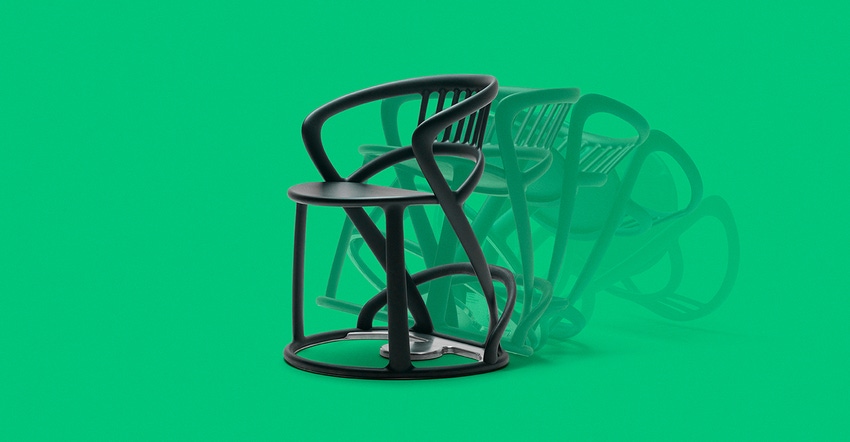The Virén Chair honors the amazing achievement of Finnish long-distance runner Lasse Virén at the 1972 Summer Olympics as well as the resilience of plastics.
February 18, 2022

What does the remarkable story of Finnish long-distance runner Lasse Virén, who fell down during the 10,000-meter final at the 1972 Summer Olympics yet went on to win the race, earn a gold medal, and set a new world record, have to do with a plastic chair? Resilience. That’s the message behind the “self-rising” Virén Chair developed by European energy company Fortum.
The chair is made from Fortum Circo, a recycled plastic compound reinforced with cellulose fiber, and its design is inspired by the stylish plastic furniture produced in Finland in the 1960s. The chair also has the uncanny ability to right itself when it’s tipped over, hence the “self-rising” descriptor. Intrigued? Check out the video.
Jussi Mälkiä, Brand Manager at Fortum, explained the concept and its underlying significance in a news release yesterday. “The story of Lasse Virén — and especially his legendary win in the Munich Olympics — is still inspiring for many of us. Our ambition was to honor comebacks, progression, and resilience through the Virén Chair and to show what can be achieved with recycled plastics today,” said Mälkiä. “Furthermore, the Virén Chair pays respect to Finnish design with characteristics of plastic furniture developed in the 1960s by Finnish designers.”
The use of recycled plastic in the chair’s fabrication is central to Fortum’s messaging. “Plastic is in many ways a superior material that is hard to substitute,” explained Anniina Rasmus, Brand Sales Manager at Fortum Recycling and Waste. “The consumption of plastic is growing globally all the time; the discussion around plastics should instead focus on how to increase recycling. We should make sure that the value of the material is preserved by recycling the plastic and converting the waste into reusable material whenever possible,” said Rasmus.
Fortum Circo recycled plastic was developed as a sustainable substitute for virgin materials, explained the company, which oversees the entire recycling stream, from sorting of the waste material in compliance with strict quality controls to a multi-step mechanical recycling process. Sustainability is a holistic endeavor within the company: The carbon footprint of Fortum Circo is about half of virgin plastics, and the added cellulose fiber comes from renewable sources and absorbs carbon, further reducing the product’s carbon footprint, according to the company. Moreover, Fortum is an energy supplier to several European countries and, with its subsidiary Uniper, claims to be the third largest producer of CO2-free electricity in Europe.
By the way, if you think the Virén Chair might make a nice addition to your home interior, sorry to disappoint, but it's not for sale. The chair is not in production, informed Fortum, and only a limited number of prototypes exist to showcase Fortum Circo.
About the Author(s)
You May Also Like




